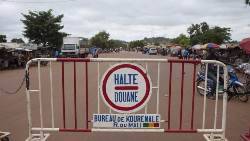The Ebola outbreak shows no signs of abating, has killed 3,879 people and threatens more Western African nations poorly equipped to deal with the disease, the World Health Organization has said in a report.
The UN's health authority said on Wednesday that a total of 8,033 people had caught the infection up to October 5, and 3,879 of those had died. Liberia and Sierra Leone, the two worst-hit nations, had less than a quarter of the beds needed.
The news comes as the United States reported that the first patient diagnosed of Ebola in the country has died.
"The situation in Guinea, Liberia, and Sierra Leone continues to deteriorate, with widespread and persistent transmission of Ebola," the organization said. "There is no evidence that the EVD epidemic in West Africa is being brought under control."
It said a reported fall in the number of new cases in Liberia was "unlikely to be genuine" and rather reflected how responders were being overwhelmed by data.
Meanwhile, Ellen Johnson Sirleaf, Liberia's president, said on Tuesday that international aid to battle the Ebola epidemic was arriving too slowly in her country.
"We just need to see a little bit faster action, that's all. But certainly, in terms of resources both human and financial as well as material, I think the response is well appreciated and is very good. We would like to speed it up," Sirleaf told the Reuters news agency.
Burial workers ended a one-day strike in Sierra Leone over unpaid wages, which left contagious corpses of Ebola victims at homes and on the streets of the capital, Freetown.
Health workers in Liberia have also threatened to strike if their demands of a $700-a-month salary and safety equipment were not met by the end of the week.
US Secretary of State John Kerry meanwhile issued an "urgent plea" to all nations to boost their response to Ebola, as the US announced it was sending 100 marines to Liberia.
"More countries can and must step up," Kerry said, warning there were "still not enough countries to be able to make a difference".
The World Bank estimated that the economic toll of the largest Ebola outbreak in history could reach $32.6bn if the disease continues to spread through next year.
Jim Kim, the president of the World Bank, urged western governments to back a new $20bn global health fund that would be able to react instantly to emergencies.
New cases
The Red Cross charity has confirmed that one of its aid workers was under observation in Cairns Hospital in Australia after returning last week from working with people affected by the Ebola virus in West Africa.
Meanwhile, the US confirmed the death of Ebola patient Thomas Eric Duncan, a Liberian, who fell ill shortly after arriving in the US on September 20. He had been isolated since September 28 and died in a Dallas hospital.
Health officials have identified 10 people, including seven health workers, who had direct contact with Duncan while he was contagious. Another 38 people may have also come into contact with him.
His death comes two days after a Spanish nurse was confirmed ill with the disease. She is believed to have been infected while treating a Spanish missionary who had been evacuated from Sierra Leone.
The Madrid regional government said on Wednesday that it put the nurse's dog to sleep after the police retrieved it from the apartment where Teresa Romero lived. Animal rights groups sought to stop the authorities through an online campaign to save the animal, but the officials proceeded with the court order.
PHOTO CAPTION
A sign is seen at the border with Guinea in Kouremale, October 2, 2014.
Al-Jazeera


 Home
Home Discover Islam
Discover Islam Quran Recitations
Quran Recitations Lectures
Lectures
 Fatwa
Fatwa Articles
Articles Fiqh
Fiqh E-Books
E-Books Boys & Girls
Boys & Girls  Women
Women










